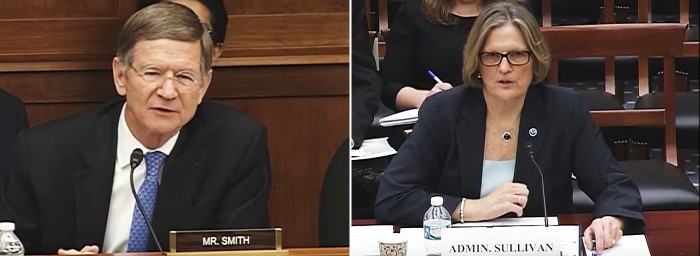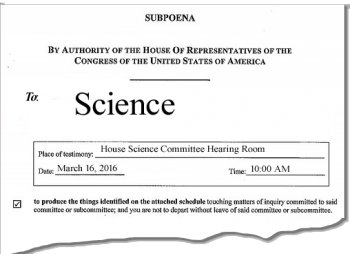
Chairman Lamar Smith (R-TX) questions NOAA Administrator Kathryn Sullivan at a budget hearing of the House Committee on Science, Space and Technology.
After a brief relaxation of hostilities, the House Committee on Science, Space and Technology and the U.S. National Oceanographic and Atmospheric Administration are again at odds over the committee’s demand for internal agency emails.
In October, the committee issued a broad subpoena for all NOAA records, including the emails of staff scientists, that related to an agency analysis refuting the claim global warming had slowed down. Hundreds of scientists came to NOAA’s defense. The Union of Concerned Scientists called Chairman Lamar Smith’s request “harassment” and questioned the implications of the demand for internal communications. A UCS blog called the committee’s actions a witch-hunt. The American Academy for the Advancement of Sciences (AAAS), along with seven other scientific groups, stated, “[S]cientists should not be subjected to fraud investigations or harassment simply for providing scientific results that some may see as politically controversial.”
Following the uproar, in December, the committee backed down on its request. But on February 22, Chairman Smith wrote NOAA claiming the “slow-pace” of its response “creates the perception that the Agency is deliberately attempting to impede and hinder the Committee’s oversight.” He then broadened the search parameters for internal communications to include the words “climate,” “change,” “temperature,” “ship,” and “president” among others, effectively requiring NOAA staff to review many thousands of agency emails in a search for any of those words.

The controversy lies not in the fact that the committee wants, or is challenging, the study’s data, but that its Draconian request for internal communications is designed to have a chilling effect on the work, and workings, of agency scientists. The data are online, available for expert review — which makes Chairman Smith’s requests for communications between NOAA employees seem all the more like a witch-hunt. Smith defended his actions stating that “whistleblowers” had said that NOAA rushed publication of the paper without first obtaining internal approval. He and the committee have maintained that no information regarding the position or identify of the whistleblowers will be forthcoming.
NOAA Communications Director Ciaran Clayton told the Washington Post:
The notion that this paper was rushed to publication is false. In December 2014, the co-authors of the study submitted their findings to Science — a leading scientific journal. Following a rigorous peer review process, which included two rounds of revisions to ensure the credibility of the data and methodologies used, Science informed the authors that the paper would be published in June.
On March 16, 2016, NOAA Administrator Kathryn Sullivan testified before a committee budget hearing. Rather than focus on the agency’s proposed 2017 funding, Chairman Smith used the opportunity to launch into a climate debate with Sullivan stating NOAA should be focused on weather, accusing the agency of “hyping a climate change agenda” and proclaiming “climate alarmism often takes priority at NOAA.” Sullivan has still not fully complied with Smith’s subpoenas, which she says are “too broad”. Smith continues to assert that the study published in Science was rushed to publication. However, Science has told NPR that the study was subjected to extra oversight and scrutiny given the controversy surrounding the topic.
To the scientific community, the committee’s agenda is clear. Smith has taken an unshakable position that climate change is “science fiction” and his committee has reposted an Investor’s Business Daily article on its website questioning NOAA’s integrity and suggesting the agency is engaged in “junk science” and fraud. A better question is whether the committee is wasting taxpayers’ money to defend the lie that climate change is a fallacy and to obstruct new agency findings that climate change is continuing.
Robust debate is healthy for the advancement of science. But the tactics employed by the Committee on Science, Space and Technology are beyond the realm of debate. If science is to continue its unbiased pursuit of truth, it should be through a forum of healthy, respectful discussion and deliberation, far from the intrusive hand of politically motivated congressional committees.
«« »»

Bethany Ordonez will graduate from the Pace Masters in Environmental Science program this May. She holds a BS in biology from Mercy College and is originally from South Africa. Bethany is interested in the marine environment, especially the effects of climate change on oceans, such as ocean acidification and rising sea temperatures.

I thought only certain extreme Republicans believed climate change was not a real thing. It never occurred to me that actual environmentalists could make the claim that climate change is slowing down. If you take this weekend for example with the dramatic weather change, it felt like there was winter and summer in the same weekend. That is not exactly proof that climate change is happening, but it has to be a by-product of climate change. Sometimes I have issues with listening to the big groups like the NOAA and the committee of science because I think they have too many people and too many different inputs going on that could potentially throw off our concerns. If climate change really is not happening, then the corporations and extremists who have not believed in climate change win. With that being said, there would be serious changes coming our way. I mean on the good side, there are people looking at the possibilities and analyzing what is happening in our world and environment. However, I do believe climate change is happening and it is at its most extreme point today than it was a few days ago. It constantly changes.
After reading this post and hearing of many more instances of similar reactions to climate change from American politicians my only question is simply, why? As I sit here thinking about the fact that numerous cities across the country experienced their warmest December on record, yet we just had snow a week ago in April, I simply cannot grasp how anyone can deny climate change. It is disheartening to see that representatives elected by our own people are not only failing to act on something that can very likely devastate our world and everyone in it, but also wasting tax payer resources to pursue such a ridiculous witch hunt in order to refute it. What could possibly be the reasoning behind Chairman Smith and many other politicians’ rejection of a scientifically proven phenomenon? Do they really not believe what is occurring right in front of their eyes, or are they acting to pursue someone else’s agenda?
Climate change deserves way more press then it has in the past. Society as a whole is more educated on the topic and is in no position to dispute the existence of climate change. Congressman Smith is pursuing an investigation for inconsistencies that don’t exists. I’m not surprised he has to go to such lengths in attempt to disprove an already widely accepted phenomenon.
The dispute over climate changed is exhausted and the only way we can make a positive change is when we stop fighting over it’s existence and start compiling solutions. Smith is investigating irrelevant inner communications between NOAA employees. The underlying fact that needs to be emphasized is that the NOAA released their data online for experts to review, which only leads me to believe that Congressmen Smith willingly ignored the opportunity to inform himself. Science has no political agenda, it simply exists to educate and enlighten the public with raw facts. My only question is why try and punish a process that has and will continue to benefit our society?
This is the problem with American politics. Scientific research has proven climate change is true, and a serious issue that should be taken seriously by the House Science Committee. The committee exists to accept the facts and make decisions that help people, rather than ignore the facts and waste taxpayer’s money denying climate change. The actions by Chairman Smith are cowardly and an injustice to the American people.
They are definitely an injustice, and yet we need to ask ourselves, how many of the American people are actually aware of what is going on? It seems to me that such a huge waste of taxpayer money should be in more headlines, but it is not. I also wonder how often this actually happens that we are not aware of?
I can’t believe that I am reading something like this. How is it possible that people like Lamar Smith (R-TX), who clearly displays little to no education in science, are able to get on the House Committee of Science, Space and Technology? The people on this committee should at least have some type of educational background in science. For Chairman Smith to ask the scientist’s at the NOAA to give up all of their emails that mention anything about climate change is absurd. He is acting like scientists don’t double, triple or even quadruple check their work before sending it to their peers, where their work gets checked over again. This is how science works and how it always worked. All of mankind’s scientific discoveries and advancements went through the same process. I believe Smith is conducting this witch-hunt out of desperation. Global warming is real and the facts that prove it are stacking up. This search through all the scientist’s emails is just a desperate attempt to find any little thing that could diminish the credibility of the scientists. Global warming is real; we all have witnessed some type of unusual weather pattern or severe storms due to global warming. The time for debate over, the time to solve these issues has begun. I have one question for those in Congress who continue to deny that global warming is real, how much money are the oil companies paying you?
I agree that to serve on the Science committee that some education is needed, however this is sadly not the case. It seems unbelievable that the people making decisions about funding for science don’t have much of a background in the sciences.
The issue that haunts me the most and is endemic in every subject is inconsistency. How can both Democrats and Republicans, but especially Republicans, deny the issue of climate change as a substantive variable in the pursuit of global leadership? The United States military has found time after time, strong security implications due to climate change that could exacerbate terrorism. How can a military-loving Republican then believe climate change is a lie?
I might be aggressive in my tone here, but a simple way of correcting wrongs is pointing out inconsistency. How can a member of the House deny the scientific findings of the military? If they can’t, then how or why would they deny the science behind a civilian scientist?
The bottom line, and really the only way to stop corporate and crony politicians is to end money in politics. Once politicians are not corrupted by big oil, finance, or corporate interests, we can truly have a level playing field where the opportunity for scientific ideas can be respected.
I completely agree this witch hunt is a complete waste of taxpayers money in the attempt to defend the lie that climate change doesn’t exist. My opinion is that those who deny climate change at this point, with all the science backing it up, will only change their opinion once some drastic disaster occurs that is undeniably the result of climate change.
What seems shocking to me is the fact that this huge waste of taxpayer dollars is not being halted. It seems that Mr. Smith is standing by his request for all these emails and had paid no mind to the cost of his request. I would like to know who he has in mind to read all the emails if he ever was to receive them.
I am surprised that the committee is trying to argue with the data collected. This have been tested and written down so why argue with facts?
Climate change is anything but fake. All around us there is proof of human activity changing the world and not always for the better. There should be no question that climate change is real. With 99.9% of scientists agreeing and the research to back it up how can believers like the cornucopians say they are right. From ice core samples to just dating climate patterns, the green house effect and so on show how our world is changing. The government is afraid because when it comes to whose most responsible for the clean up America is the most responsible. From coal emissions and other fossil fuels we started the industrial revolution and so created a chain reaction. China may be in the lead now but the top ten countries such as China, the US and India need to start thinking green and do it now. There is nothing “fraud” or “junk science” testing about it. It is definitely a witch hunt going on because like it is written, information is posted online for people to see and review. Climate change isn’t a lie. It is a basic fact that humans need to step up and admit they are ruining the world they live in. Those who believe that climate change is not real stay focused on how it’s snowing in spring and that means global warming isn’t real there is a difference between weather and climate and if these senators and house of reps. looked more deeply into the issues and educated themselves they would know the difference. Hopefully people start believing in climate change now and work for the future and not just now because witch hunts as these are why we won’t be able to fix what we can now. There’s no going back but we can prolong the enevitable.
Very well written. I agree, how could anyone argue against climate change?
Political polarization results in the marginalization of issues that aren’t typically the subject of debate. Because most political candidates base their stances on controversial issues such as foreign and domestic policy, civil rights, immigration, etc, science and environment issues elude the public eye. If issues, such as the aforementioned policy, rights, immigration, didn’t result in such hostile debate, there would be time to debate other issues. Quite unsettling.
I think what you’re doing is for a great cause and I’m glad someone is trying to change the world one problem at w time
This article provides excellent insight into the scientific world and how the publication process is extremely important and requires critical peer-review. To hurry such an important article which can contain controversial materials only makes it even more controversial. The argument also debated within the article which can be found online. as per stated in this article, is about climate change and the ideology on how its slowed down. This argument should be ridiculed and not looked through the rose-colored glasses that the NOAA seems to have on because the perspective of climate change is a global and ever-changing issue.
I thought the article was very well written and had great detail. Climate change is something that should not be ignored.
This is a great read. It crazy to think that so many people would still go against a scientifically proven idea. I wonder at what point in the research, do these na sayers finally accept the facts that are presented to them. Anyways keep up the good work, loved it
I think they stand so firmly behind their climate change denial because to accept climate change as real would have wide-ranging implications that they do not want to even consider. For example, it would mean setting limits on the oil companies and I am sure that is not something that they would like to think about doing. What I find most frightening though, is the political meddling in the scientific process. It seems that Mr. Smith is trying to scare scientists so that they don’t ever disagree with him or any other politician, and if that happens it would have disastrous consequences.
It doesn’t shock me that people and even scientific groups are still so fully rejecting any claims about climate change and the serious threat it poses to not only the environment, but society. Admitting problems, such as rising sea levels and temperatures, are real will mean that those problems then have to be addressed on a large-scale, and that is not easily done. What is easily done, however, is refusal to believe any claims that there is a problem in the first place. The desire to do this is almost understandable- no one wants to face climate change. Despite that unpleasant truth, intrusive actions are not justified. As long as studies and research articles are published in the manner that the scientific community has deemed appropriate, then there is no reason to try and disprove claims by crying “fraud”. Just because something is controversial does not necessarily mean it is wrong. The only proper and mature way to counter a scientific argument is with facts and more research that supports the new claim. This is, of course, a difficult and time-consuming process. So while it is deplorable that climate scientists are disregarded and doubted by their peers because of fear of controversy, it is not exactly surprising.